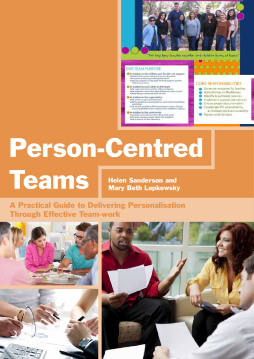
Additional Information
Book Details
Abstract
Person-Centred Teams provides much-needed guidance on person-centred working following the roll out of personalisation and personal budgets across health and social care.
In order to deliver personalisation you need to work with staff in person-centred ways. Straightforward and easy-to-read, this practical guide describes how to do this by developing a person-centred team using person-centred practices. The authors outline their model for developing a team, and how information is recorded in a person-centred team plan. They explain:
Purpose - how to clarify a team's purpose
People - what managers need to know about each team member, and how one-page profiles can help
Performance - how to clarify service users' expectations of a team's services, and assess whether or not these are being met
Process - how person-centred practices can aid teamwork and help your team deliver
Progress - how to continuously improve teamwork and performance
Each section features clear illustrations and examples from teams to enable you to develop a person-centred team plan and work together in person-centred ways.
This guide is essential reading for service providers, managers, practitioners and students in the health and social care fields, as well as person-centred planning coordinators and user-led organisations.
The writers offer a practical workbook with suggestions based on a person-centred approach... the authors emphasise the importance of identifying team roles based on an appreciation of an individual's abilities and motivations... The text is easy to read, providing case studies as exemplars and reflective exercises, and posing reflective questions that can be worked through.
While this book is helpful, the main audiences are those who work within a variety of contexts, such as service-providers, managers, practitioners, and students in the health and social-care fields.
The Revd Dr Sharon Prentis, Deputy Director for Research and Development for the Salvation Army
Church Times
This book is a very practical guide designed to provide a clear and well illustrated example of how to define effective team work with just five themes and examples from health and community services across the charity and public sector... This essential manual is an invaluable resource for service providers, managers, practitioners and students involved in health and social care. In discussing multidisciplinary teamwork and those most effective components of this particular approach, this volume represents an important contribution to the person-centered healthcare literature and is, therefore, highly recommended to academics, clinicians and health policymakers alike.
Margot Lindsay, Research Department of Mental Health Sciences
European Journal for Person Centered Healthcare
Helen Sanderson is CEO of Helen Sanderson Associates. She has written extensively on person-centred thinking, planning, community building and Individual Service Funds. She is the co-author of A Practical Guide to Delivering Personalisation with Jaimee Lewis, of Creating Person-Centred Organisations with Stephen Stirk, and Personalisation and Dementia with Gill Bailey, all published by Jessica Kingsley Publishers.
Mary Beth Lepkowsky is owner of Pathways Facilitation Services - an organisation which offers consultancy and training on person-centred working in the human services. She is also employed as Training and Organizational Development Manager for Tri-Counties Regional Center, a non-profit that provides person and family-centred supports for individuals with developmental disabilities, based in Santa Barbara, California.
Managing individuals is a hard enough task for most managers and leaders, but managing them in teams and making the end result effective is an even bigger challenge. In this book the authors offer us some practical steps with hosts of advice and tips and tools to help us along that journey. The book makes elegant use of person centred thinking, practices and tools in the format of an easy to follow model and programme. There are assessments and checklists to help along the way, and many real examples of the materials in use. This is a book of value not just to those starting out on the team development route, but for the more seasoned manager too, as it is packed with ideas to choose from, drawn from a wide range of experiences and sources. Whilst soundly based in theory and research, it is a very useable and pragmatic guide to improving team performance.
Stephen Stirk, Director of Human Resources for the social care charity United Response
